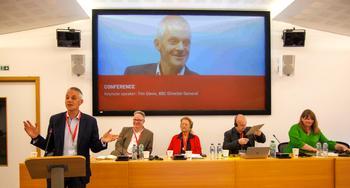#IFJLondon: We need to resist the dominance of the US and Chinese markets, says BBC director general
Tim Davie told the IFJ conference that individual countries need to fight to be able to tell their own stories and news.
In speech that spoke of the increased attacks on press freedom and journalists, Tim Davie discussed with delegates the threat to public service broadcasting (PSB).
He said it was essential the BBC during the UK election was able to question politicians without fear or favour and put pressure on their polices and promises. But more often, the corporation needed to explain the role of the journalist.

He said:
“Now we have to say ‘Hello I am a journalist – I am not here in opposition to what is being said. I am here to try to find the truth.’ We have to be increasingly transparent about our intent and the way we work.”
Delegates discussed how public service broadcasters were being shut down, particularly by extreme right governments such as Argentina, and asked the director general how they could resist these attacks and preserve the independence of journalists.
Tim Davie said a mixture of legislation and strong editorial guidelines can be used to support PSBs, but its protection was a “wider societal question”. He said if countries wanted to protect their local stories and culture, they needed to get support from beyond the politicians and bring together public institutions and journalists to appeal to the public to support a media market that is not wholly dominated by the US and China. “We need to bring people together to fight for this,” he said.
He said that in the UK, the regulator Ofcom had set down editorial guidelines and standards which supported PSBs and guarded against accusations of political bias.
In his speech, Tim Davie outlined the present critical moment of challenge for stability and democracy around the world, with growing conflict and uncertainty in the Middle East, Ukraine, Sudan, Afghanistan, and elsewhere. He said:
“Journalism is now either completely or partly blocked in around 75 per cent of the world. Only 20 per cent of people now live in what are considered to be free countries. Journalists are being denounced as foreign agents and more than 300 BBC World Service journalists are now working in exile.
“Reporters all around the world are facing escalating dangers, increased levels of persecution and harassment, and ever more subtle modes of intimidation. Nowhere more than our BBC Persian journalists who have been exposed to decades of horrendous threats and harassment.”
Saying that he is no longer on the social platform X, he said:
“We know that women journalists above all face escalating threat levels from coordinated campaigns of online abuse and three thirds of journalists report that they have experienced online violence in connection with their work.”
He went on to thank the IFJ for all its work on raising these issues with the UN and Human Rights Council and the NUJ’s work as part of the UK government’s National Committee for the Safety of Journalists.
Answering a question about the position of the BBC in India, after the attacks by the government following a documentary about Prime Minister Modi, he said: “We have not blinked, we remain in Inda and will continue to report without fear or favour to the 80m Indians a week who listen to the BBC.”
